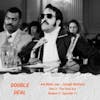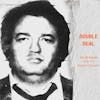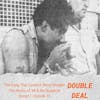
Mutual Harassment - The Plymouth Mail Robbery Investigation Continues

After the Plymouth Mail Truck Robbery, Jack and his crew were under constant surveillance by the Postal Inspectors, Feds, Staties and local Police. But it was mainly the Postals who were breathing down their necks. Not one to be a victim, Jack gave it back to them. Lara's dad, Richie, the ultimate ball breaker, was probably the most creative agitator in Jack’s crew.
Follow us on Twitter for sneak peeks of upcoming episodes. You can also find us on Instagram and Facebook.
Questions or comments, email lara@doubledealpodcast.com or nina@doubledealpodcast.com
Donate to Lara and Nina
Thank you for listening!
All the best,
Lara & Nina
Lara:
Hi everyone! Last week Nina and I discussed Jack Kelley’s armored truck heists that occurred between 1965 and 1967. After the Plymouth Mail Truck Robbery, Jack and his crew were under constant surveillance by the Postal Inspectors, Feds, Staties and local Police. But it was mainly the Postals who were breathing down their necks. Not one to be a victim, Jack gave it back to them. Dad, the ultimate ball breaker, was probably the most creative agitator in Jack’s crew. Today we’re going to share some of those stories.
Nina:
It’s going to be hilarious!
Jack was their primary suspect almost from day one. The first scheme the Postals cooked up was recruiting George William Agisotelis, aka Billie Aggie as a spy. We dedicated an entire episode to Billie’s espionage adventures, so if you want to hear about that circus check out episode 17. As always the links are in the show notes.
Lara:
Let’s give a quick recap though. It was FBI SA H. Paul Rico’s idea that Billie could help the authorities bring Jack to trial. Rico was still on the bank heist squad at the time. The postals ran with the idea. After a few threats and ample intimidation Billie agreed to become a secret agent. One might assume that the threat of sending Billie back to prison on a parole violation was his motive to cooperate, but it was more likely that he was motivated by jealousy and revenge. Although Jack remained friendly with Billie after they were both released from prison, Jack no longer trusted Billie after his arrest at Suffolk Downs in 1954. There was always doubt in the back of Jack’s mind that Billie had set him up, but it was safer to keep him close than completely cut him off.
Nina:
Billie not only agreed, one of the postal agents rented the house next door to Billie and installed a direct hotline to Billie’s house. Roaming around with a recorder strapped to his body, Billie set out on his mission to entrap Jack. In the end, Billie found himself a double agent for Attorney F. Lee Bailey. After exposing the plot on both television and radio, Bailey might have thought he had put an end to the harassment, but it only made the authorities dig their heels in more.
Lara:
The first to suffer the wrath of the Postal Inspectors was Tommy RIchards. Rather than rehash Tommy’s background here, you can listen to episode 10 for more information on his early years, and episodes 15, 16 and 17 to hear more about his role in the Plymouth Mail Robbery.
Billie Aggie had given the Postals Tommy’s name. He later claimed he gave up Tommy because he was a working stiff and knew the authorities wouldn’t find anything in their search. What utter bullshit. Petty, vindictive degenerate.
Nina:
You’re not going to get an argument from me about Billie. Thanks to his story, Tommy’s home was destroyed on October 23. It took the Postals and Marshals 15 hours to rip open every wall and ceiling. Working under floodlights well into the evening, they tore up the floorboards, broke out the patio and welded open the water storage tank. They even broke open the cinder blocks that made up the foundation.
And what did they find? A .45 caliber pistol, a bulletproof vest, a shotgun, $330 in $10 bills and two wide leather belts, one empty .45 caliber clip and two footlockers that Tommy’s wife had used to store extra clothes, including 7 pairs of shoes, 5 sets of pajamas, one leather harness, one snowsuit, three pairs of socks, four blankets and quilted crib pads, three undershirts and training pants, eight pants, two terry cloth shirts, one white sweater, one rain hat, one sport shirt, and one vest.
Lara:
What no partridge in a pear tree?
Nina:
But not a trace of the cash! Jack and Richie had already moved it to a nursery in Dover, Mass. The money was buried in a greenhouse under the potting soil that was stored there.
Lara:
The following day the FBI showed up at Tommy’s and dug up his septic tank!
Tommy sued the government and Postal Inspector Raymond Dunne for defamation of character and the damage done to his home. On April 30, 1963, the presiding judge dismissed the case, but gave Tommy 20 days to amend his complaint. Tommy never saw a dime, and the government never returned any of the items they’d taken.
Around the same time Tommy was in court, Jack and F. Lee Bailey were busy leading the authorities on a wild goose chase. Bailey decided to take his new bride on a trip to Canada, and a large empty box too.
The postals suspected that the money might be hidden there. Jack met Bailey at the Beverly Airport. He backed his car up to the cargo door of Bailey’s plane, and loaded a large cardboard box onto it. Jack made sure that the postal inspectors were tailing him and could see their every move.
Bailey deliberately neglected to file a flight plan. He flew low over the water, so the radar couldn’t track them flying up the coast of Maine then northwest over Vermont. Halfway to Montreal the control tower began calling out the number of his Cessna, and that’s when he knew the postals had taken the bait. When he landed, customs had no interest in his luggage, but Bailey told them that he had left a box on the locked plane. Like any good secret agent, Bailey sealed the box with a thin strip of tape, so he’d be able to determine if anyone had inspected the contents of it. The next day when he returned to the plane it was still locked, but the tape was no longer intact. Bailey claimed this was one of a dozen hoaxes they pulled on the postals.
Nina:
The following year Richie had his turn harassing the authorities.
Lara:
Well I suspect he was doing that on a regular basis.
Nina:
No doubt, he had been running his disinformation campaigns for a couple of years at that point, but this was a more dramatic scheme.
Lara:
Dad told Bailey that the postal inspectors approached him to kidnap Tommy Richards and squeeze him until he gave up the location of the money. The postals would be nearby where Tommy was getting worked over. If the guys beating Tommy up tried to double cross the postals, then they’d be arrested for assault and dad would get killed. But if they stuck with the plan they’d get immunity and some money. Bailey questioned why dad was telling him this story. Dad told him that he wanted to set things straight with the guys he put away in the heroin deal that he set up for the Narcs and the Feds. He told Bailey that he got squeezed into setting them up and wasn’t a stool pigeon, and if they heard he did the right thing by Tommy, they’d rethink taking revenge.
Bailey spent days interviewing dad, but dad told Bailey that the postals had become suspicious and never showed up for their meeting. In true Bailey form, he hit the airwaves along with dad. They went on the Paul Benzaquin show to share their tale. Needless to say the Postals weren’t too happy about that.
And we are still looking for the recordings. One of our listeners tried to help, but the archives at Northeastern University aren't in possession of them.
Nina:
Hopefully, they’re tucked away somewhere.
And I’m sorry, but that story of Richie’s was completely fictitious!
Lara:
Well that wasn’t the first or the last tall tale he would tell!
Nina:
Truly he missed his calling!
Ok back to the lawsuits.
Jack was also suing the government for entering his home without a warrant and through false means. In early November 1962, the Postal Inspectors showed up at Jack’s house knowing that his wife was home alone. They lied to her and told her they had a warrant for his arrest.
When she demanded to see it, they pushed past her and ripped apart the house looking for evidence. Unable to get into a locked closet, they forced the door open. Inside they found two empty money bags with the First National Bank of Boston’s logo on them, a length of clothesline, $235 in cash, and some shotgun shells.
When Jack arrived home, he asked to see Dunne’s warrant. Of course, there wasn’t one, and Dunne had failed to get one in the time he was in the apartment. But the icing on the cake was that all the items they’d taken from the closet had already been sent to a lab to be “examined”. Dunne said he’d replaced the $235 with his own money and pointed to a side table where it was sitting. Jack threw it in Dunne’s face, saying, “Don’t plant any money on me!”
Lara:
Jack’s wife, Elizabeth, who he always called Ann, had filed a suit of her own against Dunne, alleging illegal restraint. Her lawsuit sought $50,000 in damages. They had initially filed the lawsuits locally, but the government had insisted that they be transferred to Federal Court.
In March of 1965, the US Court of Appeals ruled that Inspector Dunne “acted with reckless indifference to the rights of individual citizens in entering the home without a warrant.” The case was sent back to the lower court to be tried again. A hearing date had yet to be set.
Nina:
In May ‘65 the Boston Herald Traveler reported that the Postal Inspectors believed they had enough evidence to obtain convictions. They were in the process of summarizing their evidence and expected to turn their report in to the US Attorney’s office “in the next couple of weeks.”
But that didn’t stop the Postal Inspectors from continuing their harassment campaign. While the US Attorney Garrity was waiting for their report, they turned their sights on Pro Lerner!
On June 9th, Pro was arrested outside his Brookline home while walking to Jack’s car. The Postal inspectors picked him up on an old warrant from December of 1962 when he’d allegedly written three bad checks totaling $123 in Knox County, Tennessee. Jack called F. Lee Bailey, and Pro was released on a $1,000 bond.
Lara:
The next ones to suffer from the harassment campaign were Sonny Diaferio and his wife Patricia. The inspectors paid a visit to Sonny’s home while Patricia was there alone. They pressed her about the Mail Robbery. Patricia said she only knew what she had read in the papers and heard on the news. Of course they wanted to know about Sonny’s relationship with Jack. By the time Patricia and Sonny found themselves in F. Lee Bailey’s office she was pregnant and had already suffered two miscarriages.
Bailey questioned Sonny about how well he knew Jack, and Sonny told him that he had met him a couple of times for coffee since getting out of prison. Patricia went on to have a healthy baby the following year, but it wouldn’t be long before she and Sonny would be indicted.
Nina:
Not long after Sonny and Patricia’s visit to Bailey, Jack gave an interview to Boston Globe journo Jerome Sullivan. The article outlining the investigation ran on October 1st, 1965 listing Jack as the self-styled key suspect, Billie, Tommy and Joe Tripoli as suspects and five others who the authorities refused to name. The secret five were Richie, Mello Merlino, Roy Appleton, Sonny and his wife, Pat.
Jack recounted to Sullivan how he was brought in for questioning shortly after the robbery. Within a couple of weeks he was under constant surveillance no matter where he went, and Tommy and Joe Tripoli suffered the same fate.
Lara:
In February of 1966 the Postmaster General announced that they had completed their investigation and sent all the evidence that they’d gathered to the Department of Justice. Of course, everyone was waiting for the US Attorney’s Office to convene a Grand Jury and get on with it. But the US Attorney Arthur Garrity stated that the report from the Postals was several months old and not complete. He further noted that he had requested more details and was still waiting for a response. The chief inspector of the investigation, William White, also said: “This investigation is still going on.”
Two months later, the Chief Postal Inspector, Henry Montague, conceded to the House Appropriations Committee that “104 man years” had been spent on the investigation. “This would cost very close to $1.5 million, taking into consideration fringe benefits and other items of expense.”
He tried to justify the cost by saying: “We feel that because of the investigation which has been continuously underway by our inspectors that there has been a deterrent to some other crimes of that type.”
Yeah… ok…
Nina:
Jack and the guys had just pulled off the Skelly job in Quincy the previous month, and Jack had three more heists lined up for the summer for a total of $327,000.
Finally in May of 1966 Jack and his wife’s civil suit was back in front of a judge. Mrs. Kelley took the stand at the request of her defense counsel, F. Lee Bailey. He asked her about the postal inspectors’ suspicions about her husband being the mastermind of the mail heist.
“Jack?” sniffed Mrs. Kelley in disbelief. “He couldn’t mastermind his way out of a paper bag!”
Lara:
Oh Jack must have loved that!!!!
Nina:
On one side he was glad that she said it, but on the other side you know he held a grudge!
Lara:
You know he never let anything go. Dad had that same trait.
Nina:
We’ll be seeing more of both of their “never let anything go” tendencies next season.
Back to the civil suit. The Kelleys were suing for the $235 seized during the search along with the money bags and the clothesline! In July, the judge dismissed the suit. The money bags were deemed the property of the bank, and the money and clothesline were determined to have been voluntarily given to the authorities.
Lara:
The lead investigator for the Postals was Frank Jencunas. He was in charge of the surveillance of the suspects. He frequently shared their reports with the Feds who then submitted 302s outlining the activities of Jack and his crew. We’re lucky to have a few of those 302s including one from May of 1966.
Tommy would bring his wife to his mother’s house on Dexter St in Watertown then head to Jack’s house on Irving Park. Of course dad and Pro were frequently observed in the company of Jack. Details and photographs of Pro and Dad were provided to the Feds.
Nina:
Richie stood out like a sore thumb! How many times did eyewitnesses identify him? I don’t think the Feds needed a photo to know who Richie was!
Lara:
For sure and it’s interesting because dad’s description and photos are missing from the 302s.
But that’s why dad was mostly the getaway driver. Keeping him out of sight.
That same month SA Carl Evensen submitted a 209 report naming Tommy, dad and Pro as suspects in the Essex Trust robbery of 1962. All three were listed as armed and dangerous.
On July 12th, immediately after the VA hospital heist the surveillance was beefed up. 24 hours a day a team was assigned to watch their every move. Inspectors Luther Finerfrock and Roger Daily were assigned to dad, Jack and Pro. The postals communicated via two way radio about each of their subjects. Pro’s green Thunderbird and Jack’s bright gold Cadillac must have been easy to track.
Nina:
Maybe Pro adopted Jack’s green superstition.
Lara:
Maybe, but in Jack’s case he deliberately chose the flashiest of cars to make the postals’ surveillance easier for them. In turn it made his surveillance of them and the Feds easier.
Of course Jack dragged them around to the Town Diner in Watertown on most days. One of his favorite games was to accelerate gradually until the inspector tailing him was too busy driving to know where he was going. Jack would turn up a dead-end street. As the inspector wrestled his car to a stop, Jack would make a power-skidded left turn, wheel around behind the postal’s car, and block the road. Then he would walk over to his tail and ask what the inspector happened to be doing in the neighborhood.
Nina:
Hey, it was mutual harassment!
Another great story was when Jack and a postal agent became involved in such a tight race that their cars collided on the Longfellow Bridge in Boston. When Jack leaped from his car to confront the postal agent, Jack said that the agent produced a pistol and pointed it at Jack’s head. Jack contacted Bailey, who promptly filed a complaint for assault against the agent. The case was dismissed when the agent swore that all he had pointed at Jack was his pipe.
Lara:
A pipe? Who drives around with a pipe?
Well, they even had surveillance on Millie Spadaro, Jack’s girlfriend.
Nina:
The bird lady! The woman was taken to court for feeding the pigeons after refusing to comply with the Meford Board of Health’s order to stop. She would throw birdseed on the ground and ended up attracting upwards of 400 pigeons. The neighbors complained about the fact that they couldn’t hang their laundry out. The birdseed was also attracting mice!
Lara:
The postals also tried to get Millie to entrap Jack. They used her young son as leverage in order to coerce her into going along with their scheme. When Jack came for his weekly visit, she was supposed to start screaming rape. Millie pretended to go along with it, but of course gave Jack a heads up. Jack’s trips to Millie’s apartment ceased. When the postals confronted her, she told them he must have met someone else.
It was interesting that Billie Aggie was often observed driving around the Town Diner, but never stopping there.
Nina:
He must have been trying to track Jack down.
Lara:
Or Jack was using him as a distraction.
Another interesting bit of information was that after July 27th when Jack and Pro had met a little after midnight at the doughnut shop on North Beacon and Market St. in Brighton they weren’t seen together for weeks. Jencunas reported to SA Dennis Condon that contact had ceased between the two of them.
Nina:
We both have the same suspicions as to why, but we have to wait until episode 42.
Lara:
I know, I know. In early August Jack was observed visiting Nicky Mancuso’s office in Watertown. You know I always thought dad had made up Nicky Mancuso in his stories to the Feds because there was an actor by the same name.
Nina:
Kind of like me thinking Jimmy made up Frank Smith, but they were both real!
Lara:
Exactly! Jack was also seen parked on Charles St. in Boston. Somehow the postals hadn’t figured out that Jack was meeting with dad in my family’s grocery store there even though magically dad and Jack would appear in Jack’s Caddy not long after.
Nina:
The postals obviously weren’t the brightest bulbs on the tree.
Also shortly after the robbery at the VA hospital, the Boston Globe’s Ronald Wysocki ran a piece titled “Truck Heists Laid to the “Great One”.”
Wysocki met with an old-timer who told him that Jack, who Wysocki titled “The Great One”, had been responsible for all the recent armored car heists in the area, including the VA.
In each job, the robbers wore masks, used machine guns and pulled off the jobs with precision efficiency. The method of two getaway cars and two wheelmen was another of The Great One’s trademarks.
Only once during the string of bank holdups was there any gunfire and that time the police did the shooting in pursuit. That was the Essex Trust robbery in March 1962. Tommy had actually fired back at the cops that time.
But The Great One was always watched, so why couldn’t the cops catch him? Wysocki asked a local investigator.
“Nobody is always watched.” the cop said, “We were always watching Punchy McLaughlin but we weren’t there when he was shot down at the bus stop.”
“The Great One spots anyone following him. One time we were following him in a car with dealer’s plates. He called a police station and reported the car stolen. We were stopped and he drove off all by his lonesome.”
Lara:
Dad and Jack would park the gold Caddy somewhere conspicuous where they could collect parking tickets all day. And then take off in another car unknown to the authorities where they could scope out potential heists or pull off heists. And later have an alibi from the parking tickets.
Nina:
Genius.
The Great One and his men were believed by police to be responsible for some of the biggest heists in Massachusetts.
“The Great One pulls these jobs for kicks,” Wysocki’s informant stated.
The investigators agreed, “It seems to be the excitement of the planning and the pulling off of the jobs. He and the guys he’s with can’t exist with just normal living.”
Lara:
There’s no question about that. None of them robbed for strictly monetary reasons. Each of them had other means of income. Obviously not the same as they were earning taking down scores, but more than enough to live normally. Dad had the family business. Roy had his used cars. Tommy worked for the electric company. Sonny and Mello had their Texaco station. Pro could have continued to play baseball, and he had his carpet business.
Nina:
And don’t forget Jack had his used car lot, real estate office, the diners, and he was selling religious statuary!
Lara:
Stop! Can you imagine?
Anyhow, they weren’t normal guys. They lived for the plotting, scheming and planning. The rush of getting away with each heist, drug deal or con. Dad and Mello never quit. Sonny died young, but I doubt if he would have gone straight had he not.
Nina:
Pro was the only one who appeared to go straight later in life. And as for Jack, we’ll save that for next season.
Lara:
Back to the harassment. On August 11, 1966 at 7:00 in the morning dad was out walking our German Shepherd Eric along the Jamaica Way when he was approached by two men. Eric, who was trained by the Army, went into his attack stance. One of the men told dad to pull Eric back or he would put a bullet in his head. Knowing my grandmother would be watching from their apartment window, dad started screaming to call the police and that two men were trying to kill him and Eric. The men identified themselves as postal inspectors. Dad knew that, but he kept screaming. Within a couple of minutes sirens were blaring and the Boston PD was on the scene arresting the two inspectors. Dad pressed charges against them. He appeared in court on August 26th and was granted a hearing date of September 2nd. Eventually the case was dismissed, but dad took great pleasure in dragging the inspectors through the mud for a second time.
Nina:
Didn’t Richie say that Rico was so pissed off that he fired a shot at his apartment that same night?
Lara:
That’s what he said! And I tend to believe that story.
Nina:
Three months later Billie Aggie showed up at F. Lee Bailey’s office. He was in a panic that he was going to be sent back to prison on a parole violation, and that he had to report to a hearing where his legal counsel wouldn’t be allowed to attend. Bailey promised Billie that he would verify that information, which he did.
Lara:
We will cover more about Billie’s later days in episode 40.
In April of 1967, Jack sat down with a journalist from the Boston Herald Traveler. They chatted about the Plymouth Mail Robbery investigation while enjoying a leisurely lunch at the Ritz Carlton.
Nina:
They sure did love the Ritz.
Lara:
Well dad did. I’m sure that Jack would have preferred to have been lunching at one of the greasy spoons he frequented.
Jack told the journo that he believed the government had spent at least $5 million on the investigation.
Nina:
It would later be revealed that the amount was closer to $20 million.
Lara:
Can’t say they weren’t trying!
During the interview, Jack told dad’s tale about the cigar tube, mouse and Tommy Richards, but didn’t reveal dad’s name. He brushed off the idea that the heist was pulled off by out of towners, stating there were plenty of well qualified Boston boys around who were more than capable.
And of course, Jack had to get in the story about double agent man Billy Aggie.
Nina:
He also dished out some advice for his foes:
“Their biggest blunder was made back at the beginning when they scorned the assistance of state and local police authorities who have a pipeline into 80 percent of the criminal activity around Boston. The postals slammed the door shut on themselves by being so high-handed about taking charge.”
He said the best place to look for clues would be inside the Post Office. “Someone had to set the robbery up who knew about the schedules and knew those mail bags were not full of postcards.”
To further deflect attention from himself and Makris, Jack commented: “I would spend less time chasing the likes of me and Tom and consider those who have recently retired from the department to lead a life of leisure.”
Lara:
On May 21st, 1967 Jack, dad and Tommy were coming out of the Scene in Brighton when Jack was assaulted by one of the Postal Inspectors that had been tailing him for five years. Jack claimed he was kicked and punched by the agent. Jack immediately filed a complaint with the Police telling them he didn’t mind the surveillance, but couldn’t let being beaten go unanswered. He appeared in court on June 1st. His witnesses were dad and Tommy who the papers listed as suspects in the mail heist and a bartender from the Scene. Good old Jencunas was there to watch his agents paraded into court once again as the accused. Atty. Bernard Kansky, an associate of Bailey's, told reporters he planned to present evidence in the case to a Grand Jury the following week.
Nina:
Bailey tried five different times to bring lawsuits against the Postal Inspectors for harassment. He finally succeeded on the fifth round with Tommy.
As Tommy was walking home one Sunday afternoon, the Postals were harassing him as usual. And as Bailey had instructed, Tommy was ignoring them. Finally, one of the Postals snapped and rushed at Tommy with his fist swinging. Tommy still had the camera that Bailey had given him and got some photos of Inspector Donahue, his fist raised, face twisted in anger, and his arm coming around as if he was about to punch Tommy. Bailey showed the photos to a local judge who, faced with the undeniable evidence in the photos, issued an assault complaint against the Postal Inspector. But that effort also failed because Donahue’s attorney got the case transferred to a Federal Court, where it died.
Lara:
As did the rest of the lawsuits and complaints.
The surveillance wasn’t only conducted by car. In 1967, the postals also deployed small airplanes to follow the boys around. Tommy once left his home only to realize that there was one of those planes following him. He stopped at a payphone to call Jack to tell him what was happening. Jack told him in his best Boston accent, “Now don’t let them rattle you Tawm. Just drive up he’ah at meet me at the Howard Johnson’s.”
Nina:
That must have been priceless. Luckily Jack couldn’t pilot a plane. Who knows what could have happened!
Lara:
Can you imagine? Dog fights over the skies of Boston.
The Postals weren’t just harassing the boys and their women. They were also questioning just about every gambler or known robber in the area, out on the street or locked up.
On November 3, 1965, postal inspector Ricker reported on his interviews with Richard Bellan:
“In the past three meetings with Bellan, he has asked to borrow money. Although his nickname is Moose, he drinks like a fish. I think that Bellan would like to keep this going for a long time.”
Nina:
Billy Cass was interviewed at the Riverway Cafe on January 16, 1963. The Postal Inspectors reported: “He was given the pitch on the reward for furnishing information and his reply was that he would like to help us out, but he does not know a thing. It is our opinion that if he did, he would not tell us anyway.”
The following day the Postals went to the Forestry Camp in Carver to talk to Dickie Kadra, another nemesis of Jimmy Flemmi’s. “Kadra stated that he honestly did not know who was involved in the mail truck robbery but that if he did, it would be against his principles to tell us.”
Lara:
Georgie Christo, a small-time hoodlum, and acquaintance of dad’s was questioned on multiple occasions. In May 1963, the Postals reported: “He told us that he would not do a job that is ‘Federal’ and no job that would have a big ‘score.’ He is satisfied with a little b&e job that would net in the neighborhood of $2000.”
Two other men who were questioned early on were Joseph Francione and Teddy Deegan, another friend of dad’s. Their names might be familiar to you if you’ve been following along this season. Francione had been contracted to work for the Post Office installing glass partitions. That and his record made him a good suspect. He agreed to take a lie detector test and passed it in mid-September 1962. Not long after that, H. Paul Rico sent the Postals in Billie’s direction, and Francione was dropped.
The Postals showed up at Teddy Deegan’s in Everett in January 1963. Teddy was friendly and invited them inside, but he “...wouldn’t comment on the mail robbery and offered no suggestions that would be beneficial. The subject of reward and becoming an informant were discussed with him…” But Teddy wasn’t interested.
Nina:
The most interesting thing about the report was the last line: “Deegan’s photo is herewith for filing in the mug book and to show the witnesses in the case in that he fits the general description of “Buster””.
Lara:
Oh that makes sense. He and Mello looked similar. Although Buster was Sonny.
Of course the Bennett brothers were on the suspects list. Wimpy's brother, Walter, was questioned early on in the investigation. According to the postals, he was very cooperative and may have said a bit too much. But his theory was that it was the McLaughlins “with some out of state assistance”. He also suggested that they may have had help from Tommy Callahan.
The Postals concluded that while Walter Bennett had not been that helpful “... he was a valuable pipeline and further contact should be maintained to nurture this cooperation.”
Nina:
Three years later, Walter was still talking to the Postals. “As usual, he was congenial and cooperative. His first remark was “Well what do you want to know about Diaferio?” Referring to Sonny.
Walter was still convinced that Punchy McLaughlin was involved in the Mail Robbery. He told the agents that until Punchy was murdered he had been “shaking down Sonny regularly… not that he had something on him, but just putting fear into Sonny that something would happen to him.”
Walter continued on that Sonny was getting a lot of people in the middle with his stories of where his wealth came from such as gambling and borrowing from shylocks, and admitted to lending Sonny a couple of thousand dollars himself. Walter ended his statement: “You guys are on the right track.”
Lara:
Tommy Callahan was also questioned shortly after the robbery. When the Postals asked Tommy to take a lie detector test, he replied: “Do you think I’m a nut?”
Nina:
Tommy Callahan was a nut! But he wasn’t stupid!
Lara:
The agents wanted to know Tommy’s opinion about the mail truck job, he said that he didn’t have one, but if he did he wasn’t going to share it with them.
Tommy said that he was “old school” and even if he did know anything about the heist he wouldn’t tell the authorities even if the reward was a “zillion” dollars.”
The agents reported, “Tommy complained bitterly about the publicity that he had received during the investigation of this case. He showed us the newspaper (Boston Traveler) which alleged that a principal suspect was a former body guard for a top underworld czar, and that the suspect was a known killer. Callahan contended that everyone knew who the article was referring to and that this publicity was totally unjustified.”
Nina:
Good old Tommy!
One would imagine that with the indictments in the summer of 1967, the harassment would have stopped, but as we’ll see at the end of this season, Jack and his crew were hardly free to go about their business.
Lara:
Next week we’ll be covering the hit parade of 1966. 15 men fell victim to the gang war that year. Like in the Hit Parade of ‘64 and ‘65, we’ll be discussing the victims, the hitters and our theories. If you haven’t listened to either of those two episodes yet, the links are in the show notes.
As always thank you for listening in. We’re just under 17,000 downloads. Help us get to 20K by sharing, subscribing, reviewing and leaving your comments.
Nina & Lara:
BYE!!!
Featured Episode
Season 2 is finally here!


































